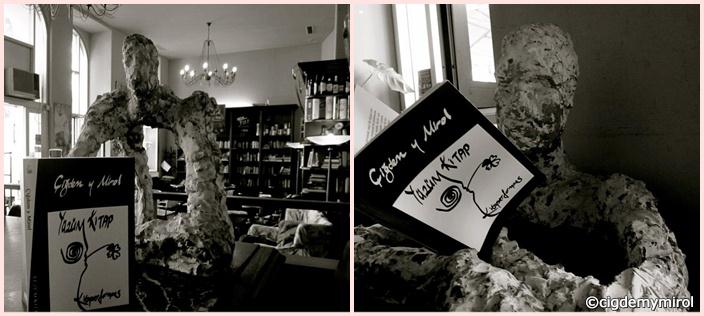Bookperformances
Every time period has some phrases that are used quite often, which I'd like to call "catch phrases." I won't take it so far as to say that they define a period, but they give an idea about it nonetheless. The phrase that I think applicable to our time is "perceptual selectivity." My first encounter with it dates back to the conversations I used to have with my mother concerning coincidences. Whenever I saw something related to a book I'd read, a song I'd listened to or a person I'd just met, it was never a source of excitement for her, but a result of perceptual selectivity. In other words, the difference between two time periods - before and after the occurrence of a certain event - was nothing more than a change in one's approach in his experience with the outside world. However, no matter how much we discussed this, I kept refusing this explanation and also the other, simpler one: the world is a small place, and it keeps getting smaller as we narrow down our focus to countries, cities and groups of people.
Yes, I must admit that I still believe in luck and chance. Or else how could I explain my first encounter with a writer whose views I so highly respect? The first time I'd come across the name Çiğdem y Mirol was during a meeting in our department head's office, in the last issue of Bilkent Magazine. As a Bilkent American culture and literature graduate, an article about her book caught my attention. So when I saw her book in CerModern Bookstore, I knew who she was. Being "busy with life," I didn't have the chance to buy the book and read it. But when I heard that she was coming to Bilkent University Library for a conference, I succumbed to the force that was telling me to communicate with her at one level or another. Thus, I went to the meeting, which was less than a hundred meters away from where I was supposed to be at the time.
To be honest, ever since I started to consider writing as a possible career, my expectations of lectures and literary meetings have been constantly increasing. To my surprise, unlike many such events that result in disappointment, this one gave me a chance to learn something that was completely new to me.
In the contemporary world and also in the past, reading and writing have been considered as two different actions that are connected through the words of the writer. This unilateral relationship between the writer and the reader is challenged in Mirol's "bookperformances." Instead of having a written and immutable text that reflects the mind of the writer, her books are the result of a collective experience within the trio of writer, reader and book.
To fully understand what a bookperformance is, the first thing to be done is to focus on its phases. Though Mirol is against the categorization of books, she chooses to classify her own works as "bookperformances" rather than novels. The book itself, even without its reader is one of the phases of the bookperformance. The second phase is the "readerauthor performance," which allows the reader to fill in the intentional gaps left by the author in the former's mind. Thus the reader, is allowed to be the writer, since his role can easily be seen as analogous to that of a writer editing his drafts. The third phase of the bookperformance is the "authorreader performance."
In addition to these phases, the reason her works are different from those in other genres is her generosity in allowing the reader to participate almost as much as she does. During her lecture, Mirol mentioned that her first book might be considered narcissistic in that its starting point is the writer herself, since she believes the best way to make sense of the world is to start with oneself. What I thought after her presentation and our short bookperformance session couldn't be more contrary to that. When I look at myself and my interactions with the pieces I write, I often realize that I write because there is no other way for me. I am more than happy when people read my pieces and relate to my opinions, but to be honest I would keep writing even if no one read my works. So, compared to her approach, my understanding of writing and books is a quite writer-centered one. When I think about hers, I see that to her writing is not a way to simply present a carbon copy of one's mind -- the latter is a quite modest approach consisting of an interaction with other people through a written medium, and thus the communication lasts even in the absence of the writer or the author.
This new approach -- or, if there are other examples of it in the past, this newly organized thought that is presented through its manifesto -- is very challenging. Her latest book, "Myface Book," as the name indicates, makes reference to Facebook, a social media platform that she admits is an almost indispensable part of our connection to contemporary life. However, she adds that what she's trying to achieve with bookperformances is to remove the role-playing and audience components of Facebook and create the "best of all possible worlds," in which there is no audience. Lacking space to further explain her intentions and her bookperformances, I would highly recommend that the interested reader have a look at her works.

